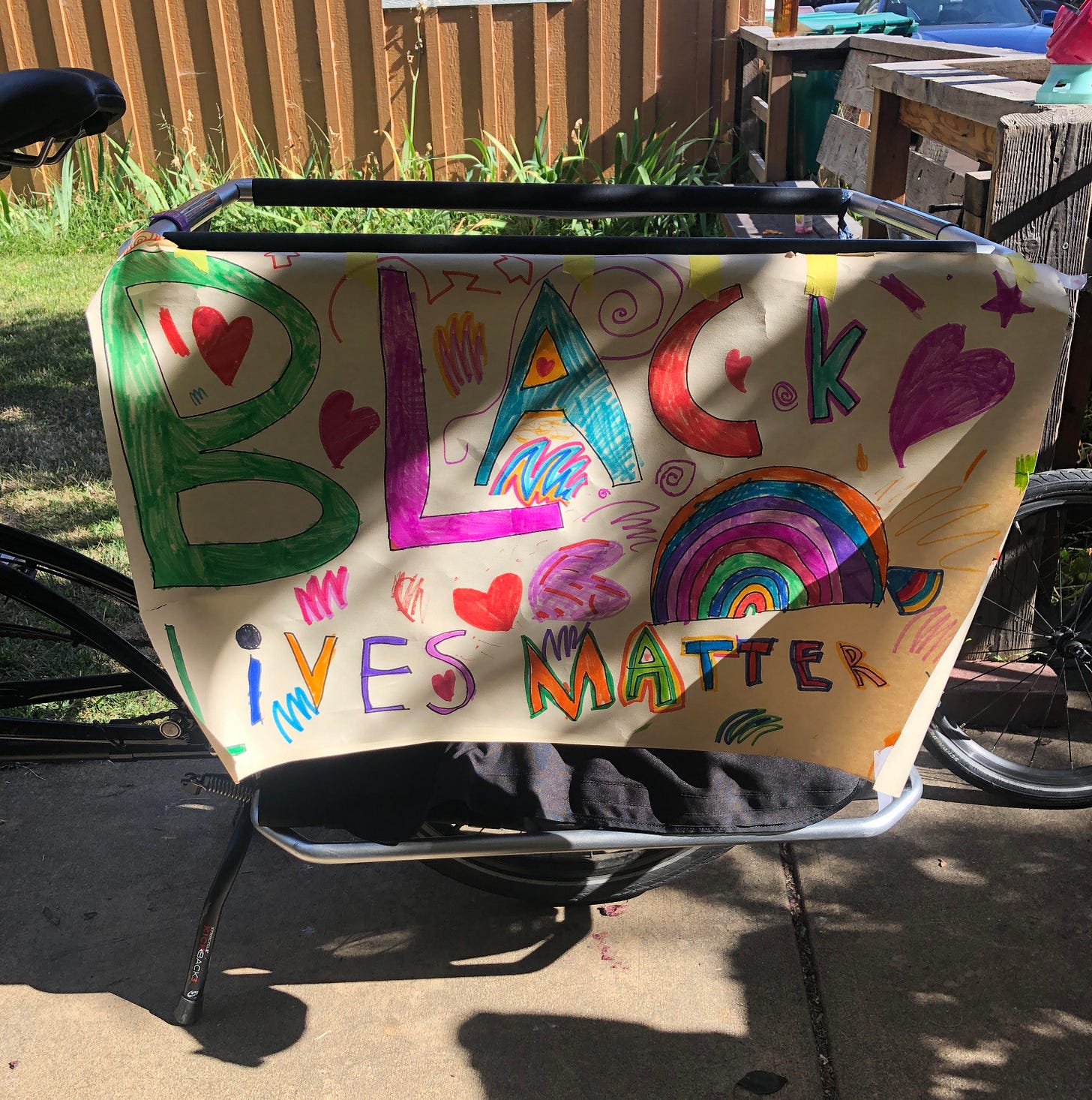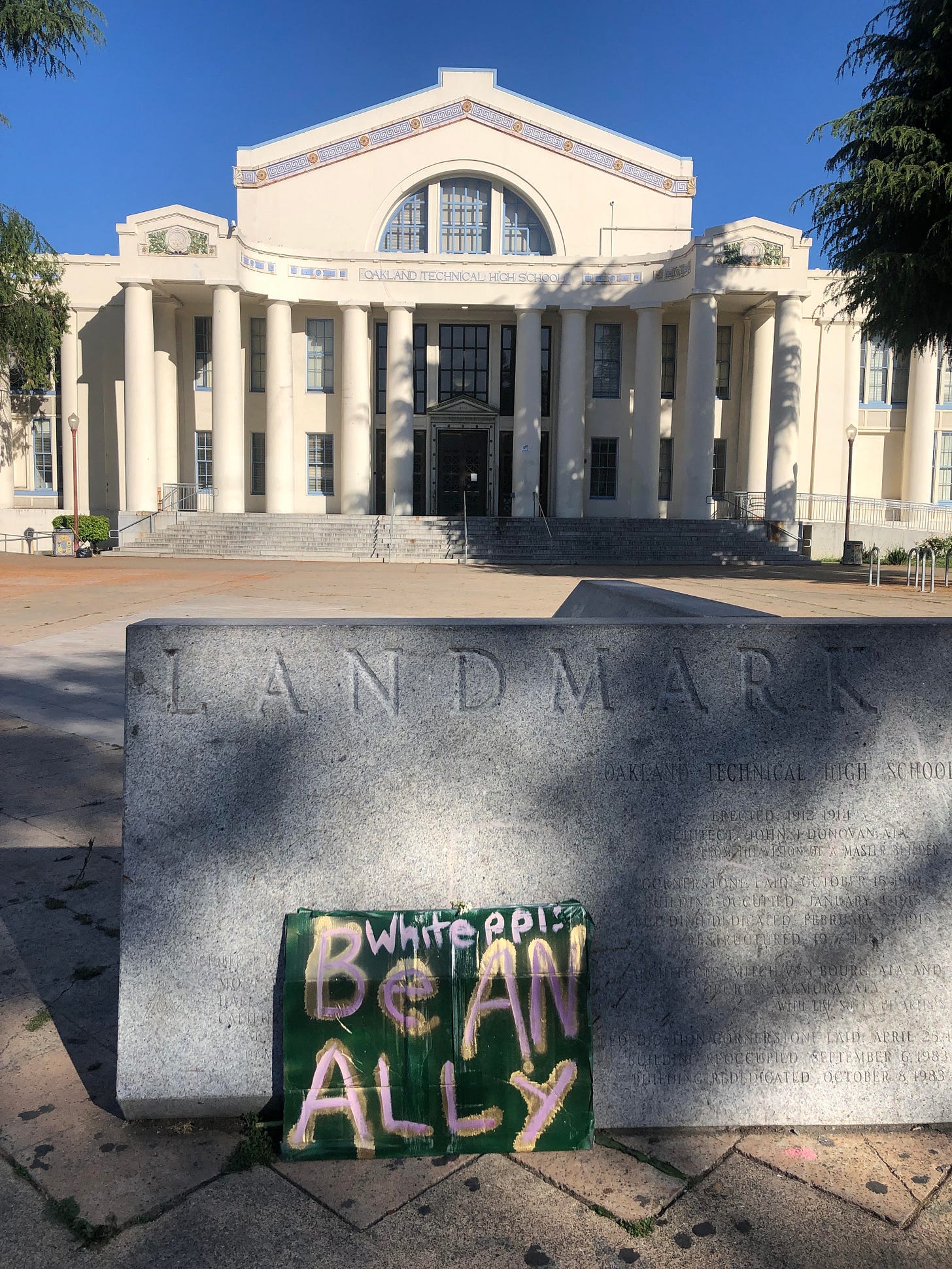My three-year-old decided that Monday was her birthday. I don’t know why. Her actual birthday is on July 30, but somehow it just became her story and she stuck to it. There were goldfish crackers and juice boxes, a sprinkler on full blast, and her big sister DJ-ing in footie pajamas. Our neighbors brought over streamers and a birthday hat that they had buried in some kitchen cabinet, as one does. There was a cake made out of play-dough and a real candle that each kid got a chance to blow out after having “Happy Birthday” sung to them (in the end, she decided if it could be her birthday, it could be anyone’s birthday in our little co-housing pod). There were skinned knees, a few tears, and lots of weird, pantless toddler dancing. Somehow, our Tortoiseshell cat ended up getting painted with streaks of purple and orange.
When I put her down for her nap, I explained that when she woke up, we would be going to a protest. Her older sister and I have been talking about police and George Floyd and Breonna Taylor for the last week in the winding, weird ways one has an ongoing conversation with a six-year-old. “I don’t understand,” the little one said after we tried to explain it to her.
“You will,” the six-year-old said. And then she spent her quiet time listening to an audio book and making our sign.

The sign she made, taped to the back of our cargo bike.
About four hours later, we were at the protest. I sat on my bike beside my husband and kids, on our cargo bike, all of us masked and a little freaked out at being so close to so many people. We’ve, at most, seen a dozen people outdoors and six feet apart for the last three months. Suddenly there we were, listening to young, powerful leaders in our city of Oakland project their voices across a sea of 15,000 people.
Every one of those 15,000 people was so beautiful--mostly younger, but a few in their 70s and maybe even 80s (they looked like real protest veterans), white and black and Latinx and Asian American and every racial identity and size and shape and gender and ability you can imagine. My six-year-old’s teachers were there. So was the newest minister in the neighborhood, my friend who is approximately 11 months pregnant, and a troop of Radical Monarchs.
Everyone wore masks. Everyone was peaceful. We even navigated getting out of the way for a few low riders that wanted to bump through the calm scene and make a bigger noise, express something sharper than the applause.
My girls were mostly bored, but I promised them a popsicle when we got home and that bought me a few more minutes. They spotted a kitten on someone’s shoulder, and that helped, too. Eventually my husband biked them home and I stayed a bit longer to take it all in.
The young people were organized--they had water and masks to hand out (notice: not sell), marshalls who were on the lookout for any violent behavior (which was not to be tolerated), and plenty of historic context to bring to bear. Their leadership felt far more mature and morally forthright than anything we’ve seen for years coming out of Washington. I’ve missed that kind of leadership, and here it was, emanating off the kids who usually hang on the corner waiting for the bus near the high school and flirting with one another. They have masqueraded as Tik Tok-ing teens, but as it turns out, they are warriors (well, of course, they are both and that’s perfect). In the tradition of their mothers and grandmothers, their great grandmothers and great great grandmothers even, these young Black Oaklanders were remaking the world right in front of me.
I realized in that moment that, at 40 years old and in this white body, I am already unable to see beyond the curve. My imagination is already tepid compared to their burning hot conjuring. When I hear “abolish the police,” it sounds far-fetched to me. And then do what? Don’t we need them? What would fill up the space where they have existed? Who would “protect and serve?”
But this is just a story we tell ourselves, a story we have been told by our white parents for generations. And it’s a story we can replace with a better story. In the same way that my daughter can just decide it’s not a random Monday, but her birthday, we, the people of this tattered geography, can decide that this is not just another June in America, it is the month that we abolish the police. It is the month that white liberals stop seeing anti-racism as their interesting side project and start seeing it as fundamental to their existence, start risking their own health to stand for it among their neighbors and strangers alike.
This is a moment begging for radical imagination.
A few months ago, most of us had never even heard the phrases “social distancing” or “sheltering in.” Now they are fundamental to the structure of our days and our emotional lives. We are re-thinking how we work and educate, how we mourn, and how we show up for our neighbors. We shop differently, we eat differently, we relate to space itself, differently. We are learning new ways to frame risk and wellbeing. We are reckoning with so many profoundly broken systems and one very broken man who somehow became our president. Everything is up for grabs.
And I mean everything. Which is why stores are being looted and cops in uniform are proving just how corrosive the evil of militarism and white supremacy really are in city after city after city, in soul after soul after soul. The curfews be damned. The social contract be damned. The center no longer holds.
A new generation is rising and they possess the wholeheartedness and rage and moral clarity necessary to harness this moment and make something of it. They aren’t daunted by the prospect of abolishing the police; they are fueled by it. They are blowing the candle out on incrementalism. They are DJ-ing their own damn party, and it is dangerous and it is elemental, and it could, if we surrender to it, change everything.
I for one, am surrendering. To the long, aimless mornings with my daughters and the country with no police, to the justice of children, which is to say, “I’m sorry. Are you okay?” and the urgency of teenagers, which is to say, “Why can’t it be another way?” To the dissolving and the truth-telling and the risk-taking and the humbling and the fear and the following, anyway.
After months of staying away from other people, we gathered with 15,000. We brought our white children. Why? Because that’s the kind of moment this is--one where you know your grown kids will one day ask you--where were we when America rose up from its pandemic pause anew and unrecognizable?
We will say: we were scared. We didn’t really know how to do it. But we followed the leadership of others, especially Black youth. We let them tell us what candles to light and what institutions to shed.
We told them, “We don’t really understand.” And they said, “You will.”

This was the site the morning after the march, not one iota of trash left behind. Only this solitary sign.
—
Are you a white and/or privileged person with questions about how to engage most effectively in this moment? Check out some collectively written answers here.




Beautiful. A beacon of inspiration when I really needed one. Thank you. xo
Dearest Courtney, this is surely one of your most inspiring narratives, coming at a moment when such inspiration is desperately needed. At over 80, among your oldest admiring readers, I'm increasingly proud to have been your teacher. You are surely at your best when faced with crises, as you were when we faced a tragic series of student suicides during our time together at Barnard. Now you bring not only your brilliant insight to a critical situation but your whole family's engagement. The collective commitment to this cause is awesome. Congratulations on this continuing activism.
Finally, thank you for leading me to Lauren Sandler's "This Is All I Got." It's a heart wrenching, eloquent testimony to another urgent problem, that of homelessness in NYC, a place that we both know well. As we protest the scourge of racism, we must at the same time keep our devastating epidemic of poverty in full view. Sandler's book renders this problem inescapable. Dennis Dalton (DD)